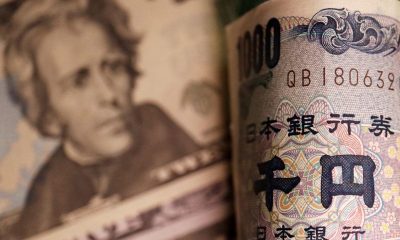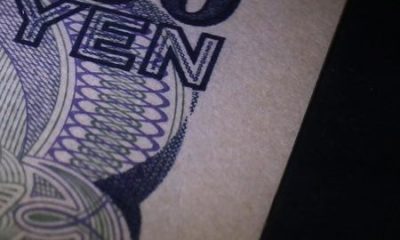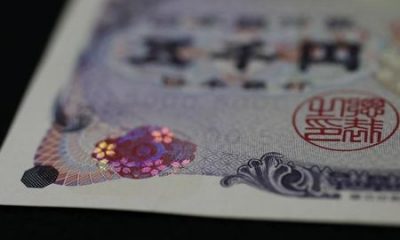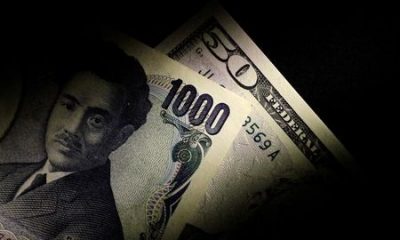Economy
Brazil cenbank chief says external scenario has not affected FX, balance of risks
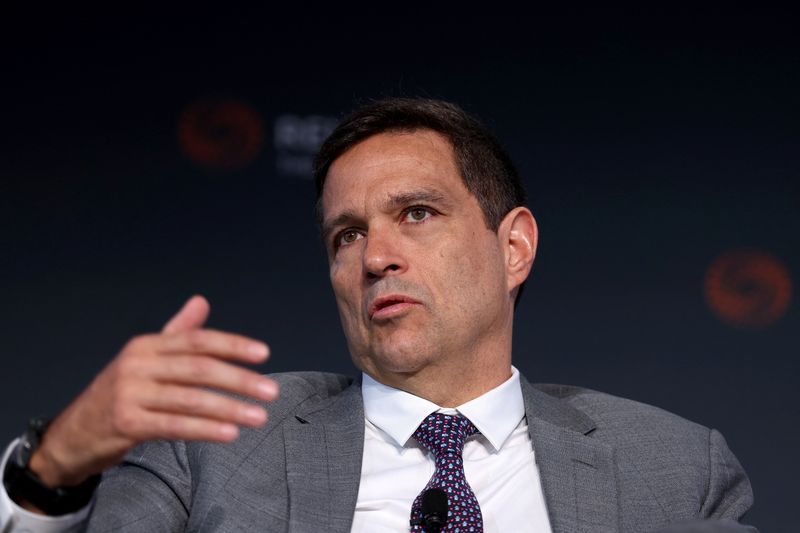
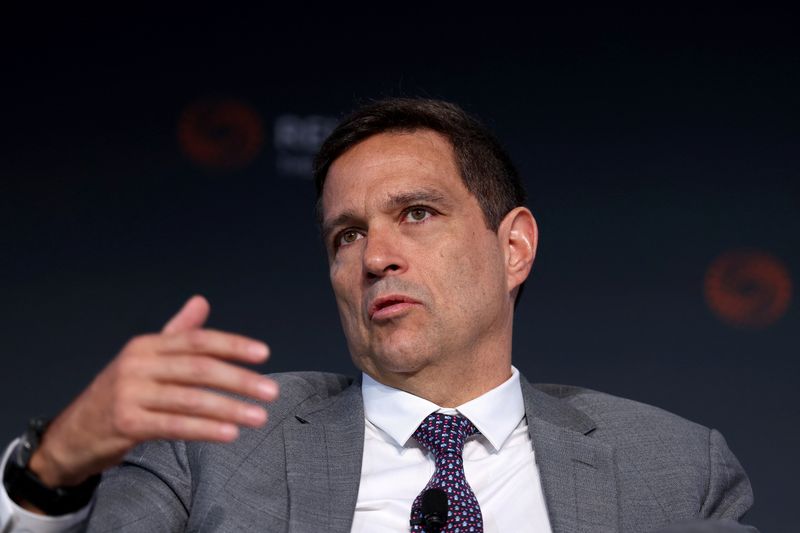
© Reuters. FILE PHOTO: Brazil’s central bank Governor Roberto Campos Neto, speaks at the ReutersNEXT Newsmaker event in New York City, New York, U.S., November 9, 2023. REUTERS/Brendan McDermid
BRASILIA (Reuters) -Brazil’s central bank chief Roberto Campos Neto said on Friday that the increased level of concern among policymakers about the external scenario has not changed to the extent of altering their inflation risk balance.
“The external scenario is more challenging, but the exchange rate did not respond. Apparently, the markets understand that there is no much greater risk,” he said at an event hosted by newspapers O Globo and Valor Economico.
“It had no effect on the exchange rate, long-term interest rates did not respond much either, what changed in our lives?”
Emphasizing that a reduction in interest rates would not result in a significant reversal in the exchange rate movement, Campos Neto noted the Brazilian currency has been performing well in a context where the country still maintains a “relatively high” interest rate differential compared to advanced economies.
The Brazilian real has appreciated 8% so far this year against the U.S. dollar, supported by positive trade flows amid strength in its agribusinesses and an improved risk perception following the approval of new fiscal rules proposed by the government.
The central bank began easing in August after maintaining interest rates at a cycle-high for almost a year to combat inflation. So far, borrowing costs have fallen 150 basis points to 12.25%, and policymakers signaled further 50-basis-point cuts in each of the next two meetings.
“Our guidance has been that the interest rate needs to be in restrictive territory, but we have not insisted on outlining a trajectory,” said Campos Neto.
He said the central bank removed from its official communication that there was a low probability of an additional intensification in the easing pace unless substantial improvements in inflation occur because that message had already been conveyed and absorbed.
He added that domestic inflation has been converging towards official targets, with improvements in core readings, but acknowledged challenges in bringing it under control.
Regarding a potential change in the government’s fiscal target to eliminate the primary deficit next year, he reiterated his support for maintaining the target, adding that the cost of losing credibility might be much higher than the fiscal space gained in any alteration.
On Thursday, Brazil’s Institutional Relations Minister Alexandre Padilha said that there would be no government initiative to change the target, following President Luiz Inacio Lula da Silva’s remarks that erasing the budget deficit by next year was unnecessary as it would threaten the financing of essential investments.
Economy
Russian central bank says it needs months to make sure CPI falling before rate cuts -RBC


© Reuters. Russian Central Bank Governor Elvira Nabiullina attends a news conference in Moscow, Russia June 14, 2019. REUTERS/Shamil Zhumatov/File Photo
MOSCOW (Reuters) – Russia’s central bank will need two to three months to make sure that inflation is steadily declining before taking any decision on interest rate cuts, the bank’s governor Elvira Nabiullina told RBC media on Sunday.
The central bank raised its key interest rate by 100 basis points to 16% earlier in December, hiking for the fifth consecutive meeting in response to stubborn inflation, and suggested that its tightening cycle was nearly over.
Nabiullina said it was not yet clear when exactly the regulator would start cutting rates, however.
“We really need to make sure that inflation is steadily decreasing, that these are not one-off factors that can affect the rate of price growth in a particular month,” she said.
Nabiullina said the bank was taking into account a wide range of indicators but primarily those that “characterize the stability of inflation”.
“This will take two or three months or more – it depends on how much the wide range of indicators that characterize sustainable inflation declines,” she said.
The bank will next convene to set its benchmark rate on Feb. 16.
The governor also said the bank should have started monetary policy tightening earlier than in July, when it embarked on the rate-hiking cycle.
Economy
China identifies second set of projects in $140 billion spending plan


© Reuters. FILE PHOTO: Workers walk past an under-construction area with completed office towers in the background, in Shenzhen’s Qianhai new district, Guangdong province, China August 25, 2023. REUTERS/David Kirton/File Photo
SHANGHAI (Reuters) – China’s top planning body said on Saturday it had identified a second batch of public investment projects, including flood control and disaster relief programmes, under a bond issuance and investment plan announced in October to boost the economy.
With the latest tranche, China has now earmarked more than 800 billion yuan of its 1 trillion yuan ($140 billion) in additional government bond issuance in the fourth quarter, as it focuses on fiscal steps to shore up the flagging economy.
The National Development and Reform Commission (NDRC) said in a statement on Saturday it had identified 9,600 projects with planned investment of more than 560 billion yuan.
China’s economy, the world’s second largest, is struggling to regain its footing post-COVID-19 as policymakers grapple with tepid consumer demand, weak exports, falling foreign investment and a deepening real estate crisis.
The 1 trillion yuan in additional bond issuance will widen China’s 2023 budget deficit ratio to around 3.8 percent from 3 percent, the state-run Xinhua news agency has said.
“Construction of the projects will improve China’s flood control system, emergency response mechanism and disaster relief capabilities, and better protect people’s lives and property, so it is very significant,” the NDRC said.
The agency said it will coordinate with other government bodies to make sure that funds are allocated speedily for investment and that high standards of quality are maintained in project construction.
($1 = 7.1315 renminbi)
Economy
Russian central bank says it needs months to make sure CPI falling before rate cuts -RBC


© Reuters. Russian Central Bank Governor Elvira Nabiullina attends a news conference in Moscow, Russia June 14, 2019. REUTERS/Shamil Zhumatov/File Photo
MOSCOW (Reuters) – Russia’s central bank will need two to three months to make sure that inflation is steadily declining before taking any decision on interest rate cuts, the bank’s governor Elvira Nabiullina told RBC media on Sunday.
The central bank raised its key interest rate by 100 basis points to 16% earlier in December, hiking for the fifth consecutive meeting in response to stubborn inflation, and suggested that its tightening cycle was nearly over.
Nabiullina said it was not yet clear when exactly the regulator would start cutting rates, however.
“We really need to make sure that inflation is steadily decreasing, that these are not one-off factors that can affect the rate of price growth in a particular month,” she said.
Nabiullina said the bank was taking into account a wide range of indicators but primarily those that “characterize the stability of inflation”.
“This will take two or three months or more – it depends on how much the wide range of indicators that characterize sustainable inflation declines,” she said.
The bank will next convene to set its benchmark rate on Feb. 16.
The governor also said the bank should have started monetary policy tightening earlier than in July, when it embarked on the rate-hiking cycle.

 Forex2 years ago
Forex2 years agoForex Today: the dollar is gaining strength amid gloomy sentiment at the start of the Fed’s week

 Forex2 years ago
Forex2 years agoHow is the Australian dollar doing today?

 Forex1 year ago
Forex1 year agoUnbiased review of Pocket Option broker

 Forex2 years ago
Forex2 years agoDollar to pound sterling exchange rate today: Pound plummeted to its lowest since 1985

 Cryptocurrency2 years ago
Cryptocurrency2 years agoWhat happened in the crypto market – current events today

 World2 years ago
World2 years agoWhy are modern video games an art form?

 Stock Markets2 years ago
Stock Markets2 years agoMorgan Stanley: bear market rally to continue

 Economy2 years ago
Economy2 years agoCrude oil tankers double in price due to EU anti-Russian sanctions

